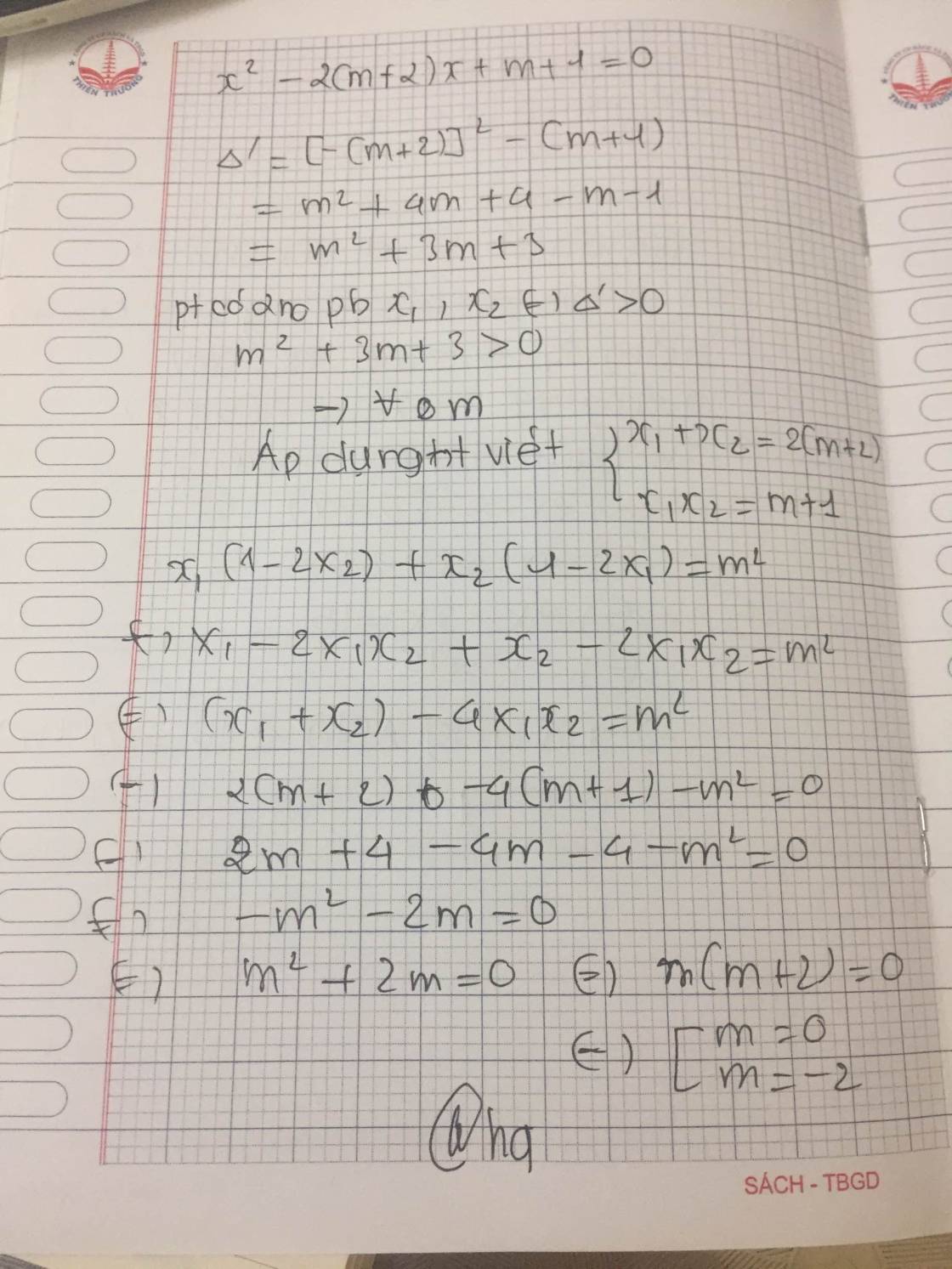cho phương trình : x^2 - 2(m+1)x + m^2 +1=0 tìm m để phương trình có 2 nghiệm phân biệt x1, x2 thỏa mãn x1- x2= 1
Hãy nhập câu hỏi của bạn vào đây, nếu là tài khoản VIP, bạn sẽ được ưu tiên trả lời.


Có: `\Delta'=1^2-(-m^2+1)=m^2`
PT có 2 nghiệm phân biệt `<=> m^2>0 <=> m \ne 0`
`=> x_1=2+m; x_2=2-m`
Theo đề: `x_2=x_1^2 <=>2-m=(2+m)^2<=>[(m=(-5+\sqrt17)/2(L)),(m=(-5-\sqrt17)/2(L))`
Vậy không có `m` thỏa mãn.
\(x_2=x_1^2\Leftrightarrow2-m=\left(2+m\right)^2\Leftrightarrow\left[{}\begin{matrix}m=\dfrac{-5+\sqrt{17}}{2}\left(L\right)\\m=\dfrac{-5-\sqrt{17}}{2}\left(L\right)\end{matrix}\right.\)

Ta có: \(\Delta\) = m2 - 4(m - 1) = m2 - 4m + 4 = (m - 2)2 \(\ge\) 0
\(\Rightarrow\) x1 = \(\dfrac{m-\left(m-2\right)}{2}=1\); x2 = \(\dfrac{m+m-2}{2}=m-1\)
Ta có: |x1| + |x2| = 4
\(\Leftrightarrow\) 1 + |m - 1| = 4
\(\Leftrightarrow\) |m - 1| = 3
\(\Leftrightarrow\) \(\left[{}\begin{matrix}m-1=3\\m-1=-3\end{matrix}\right.\Leftrightarrow\left[{}\begin{matrix}m=4\\m=-2\end{matrix}\right.\)
Vậy ...
Chúc bn học tốt!

\(x^2-2\left(m+1\right)x+4m=0\)
\(\text{∆}=4\left(m+1\right)^2-16m=4\left(m-1\right)^2\)
để phương trình có 2 nghiệm phân biệt:
\(\Leftrightarrow\left(m-1\right)^2>0\Leftrightarrow m\ne1\)
\(\Rightarrow\left\{{}\begin{matrix}x_1=\dfrac{2\left(m+1\right)+2\left(m-1\right)}{2}=2m\\x_2=\dfrac{2\left(m+1\right)-2\left(m-1\right)}{2}=2\end{matrix}\right.\)
Ta có:
\(x_1=-3x_2\)
\(\Rightarrow2m=-6\Rightarrow m=-3\left(TM\right)\)
Vậy ...

Phương trình đã cho có hai nghiệm phân biệt khi
\(\Delta'=\left(m+1\right)^2-\left(m^2+2\right)=2m-1>0\Leftrightarrow m>\dfrac{1}{2}\)
Theo định lí Viet: \(x_1+x_2=2m+2;x_1x_2=m^2+2\)
Khi đó \(x_1^3+x_2^3=2x_1x_2\left(x_1+x_2\right)\)
\(\Leftrightarrow\left(x_1+x_2\right)^3-5x_1x_2\left(x_1+x_2\right)=0\)
\(\Leftrightarrow\left(2m+2\right)^3-5\left(m^2+2\right)\left(2m+2\right)=0\)
\(\Leftrightarrow m^3-7m^2-2m+6=0\)
\(\Leftrightarrow\left(m+1\right)\left(m^2-8m+6\right)=0\)
\(\Leftrightarrow\left[{}\begin{matrix}m=-1\left(l\right)\\m=4\pm\sqrt{10}\left(tm\right)\end{matrix}\right.\)

\(\Delta=\left(-m\right)^2-2.1.\left(m-1\right)\\ =m^2-2m+1\\ =\left(m-1\right)^2\)
Phương trình có hai nghiệm phân biệt :
\(\Leftrightarrow\Delta>0\\ \Rightarrow\left(m-1\right)^2>0\\ \Rightarrow m\ne1\)
Theo vi ét :
\(\Leftrightarrow\left\{{}\begin{matrix}x_1+x_2=m\\x_1x_2=m-1\end{matrix}\right.\)
\(x^2_1+x^2_2=x_1+x_2\\ \Leftrightarrow x^2_1+x^2_2=m\\ \Leftrightarrow\left(x^2_1+2x_1x_2+x_2^2\right)-2x_1x_2=m\\ \Leftrightarrow\left(x_1+x_2\right)^2-2x_1x_2-m=0\\ \Leftrightarrow m^2-2\left(m-1\right)-m=0\\ \Leftrightarrow m^2-2m+2-m=0\\ \Leftrightarrow m^2-3m+2=0\\ \Leftrightarrow\left[{}\begin{matrix}m=1\left(loại\right)\\m=2\left(t/m\right)\end{matrix}\right.\)
Vậy \(m=2\)

c) Ta có: \(\text{Δ}=\left[-2\left(m+1\right)\right]^2-4\cdot1\cdot\left(2m+1\right)\)
\(=\left(-2m-2\right)^2-4\left(2m+1\right)\)
\(=4m^2+8m+4-8m-4\)
\(=4m^2\ge0\forall m\)
Do đó, phương trình luôn có nghiệm
Áp dụng hệ thức Vi-et, ta có:
\(\left\{{}\begin{matrix}x_1+x_2=\dfrac{2\left(m+1\right)}{1}=2m+2\\x_1\cdot x_2=2m+1\end{matrix}\right.\)
Ta có: \(\left\{{}\begin{matrix}x_1+x_2=2m+2\\x_1-2x_2=3\end{matrix}\right.\Leftrightarrow\left\{{}\begin{matrix}3x_2=2m-1\\x_1=2m+2+x_2\end{matrix}\right.\)
\(\Leftrightarrow\left\{{}\begin{matrix}x_2=\dfrac{2m-1}{3}\\x_1=2m+3+\dfrac{2m-1}{3}=\dfrac{8m+8}{3}\end{matrix}\right.\)
Ta có: \(x_1\cdot x_2=2m+1\)
\(\Leftrightarrow\dfrac{2m-1}{3}\cdot\dfrac{8m+8}{3}=2m+1\)
\(\Leftrightarrow\left(2m-1\right)\left(8m+8\right)=9\left(2m+1\right)\)
\(\Leftrightarrow16m^2+16m-8m-8-18m-9=0\)
\(\Leftrightarrow16m^2-10m-17=0\)
\(\text{Δ}=\left(-10\right)^2-4\cdot16\cdot\left(-17\right)=1188\)
Vì Δ>0 nên phương trình có hai nghiệm phân biệt là:
\(\left\{{}\begin{matrix}m_1=\dfrac{10-6\sqrt{33}}{32}\\m_2=\dfrac{10+6\sqrt{33}}{32}\end{matrix}\right.\)

Ta có: \(\text{Δ}=\left[-2\left(m+1\right)\right]^2-4\cdot1\cdot\left(m^2+1\right)\)
\(=\left(2m+2\right)^2-4\left(m^2+1\right)\)
\(=4m^2+8m+4-4m^2-4\)
=8m
Để phương trình có hai nghiệm phân biệt thì Δ>0
hay m>0
Áp dụng hệ thức Vi-et, ta được:
\(\left\{{}\begin{matrix}x_1+x_2=2m+2\\x_1x_2=m^2+1\end{matrix}\right.\)
Ta có: \(\left\{{}\begin{matrix}x_1-x_2=1\\x_1+x_2=2m+2\end{matrix}\right.\)
\(\Leftrightarrow\left\{{}\begin{matrix}2x_1=2m+3\\x_1-x_2=1\end{matrix}\right.\Leftrightarrow\left\{{}\begin{matrix}x_1=\dfrac{2m+3}{2}\\x_2=\dfrac{2m+3-2}{2}=\dfrac{2m+1}{2}\end{matrix}\right.\)
Ta có: \(x_1\cdot x_2=m^2+1\)
\(\Leftrightarrow\dfrac{\left(2m+3\right)\left(2m+1\right)}{4}=m^2+1\)
\(\Leftrightarrow4m^2+2m+6m+3=4m^2+4\)
\(\Leftrightarrow8m=1\)
hay \(m=\dfrac{1}{8}\left(nhận\right)\)